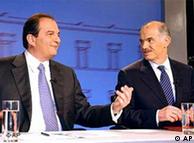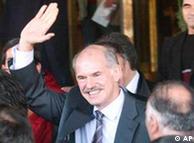Elections | 05.10.2009
Socialist George Papandreou claims victory in Greek elections
With 87 percent of the vote counted, Greece's main opposition, the socialist PASOK, has claimed victory. According to the interior ministry website, the Socialists have won an absolute majority, winning 160 seats in the 300-seat parliament.
"We stand united to face the big responsibility to change our country into a nation of justice, solidaritzy, humanity and green development," said Papandreou to a cheering crowd.
The ruling conservative New Democracy party came in second with just 34 percent of the vote, which translates to 93 seats.
Papandreou called the results "a message of hope, for change, and a just society, a more democratic and transparent society."
Sunday's vote was the third face-off for 57-year-old US-born Papandreou, and Prime Minister Costas Karamanlis, 53, a powerful speaker who appeals to the average Greek. Both men are heirs to two of the country's most powerful political dynasties.
Scandals and economic woes
Weakened by scandals and a fragile parliamentary majority, Karamanlis called the snap poll in September, gambling he had a better chance of winning now than later in his four-year term.
 Bildunterschrift: Großansicht des Bildes mit der Bildunterschrift: It's the third face-off for the two leaders
Bildunterschrift: Großansicht des Bildes mit der Bildunterschrift: It's the third face-off for the two leaders
First elected in 2004, Karamanlis said ahead of the vote that he needed a strong new mandate to tackle Greece's economic troubles.
The vote comes at a time when the Mediterranean country, seen as the eurozone's weakest link, needs a strong government to deal with an economy on the verge of recession.
Papandreou now faces a budget deficit topping six percent of gross domestic product (GDP), rising unemployment and deep dissatisfaction over the education system, social security and immigration.
Extravagant promises?
The Socialist leader promised a three-billion-euro ($4.36 billion) stimulus package on a platform of taxing the rich and helping the poor, while incumbent Prime Minister Costas Karamanlis called for two years of austerity.
Some economists have questioned the wisdom of Papandreou's spending plan, saying it could lead to more borrowing at a time when Greece already has the eurozone's second biggest debt after Italy as a percentage of GDP.
After years of robust growth, Greece's output, about 2.5 percent of the eurozone's total economy, is set to slow to zero growth or even enter negative territory this year, with key drivers and job providers like tourism particularly hard-hit.
av/rb/dpa/Reuters/AP
Editor: Nigel Tandy

Comments